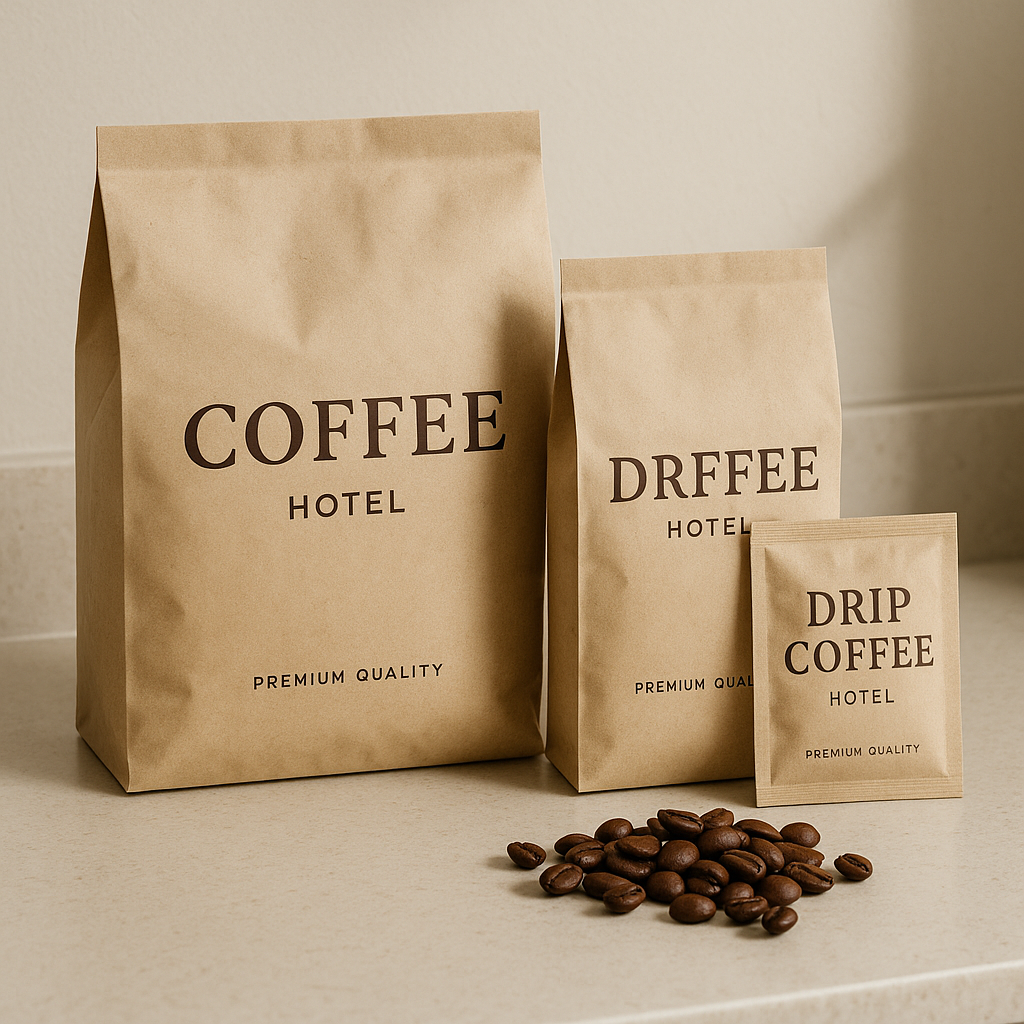Today, hotels demand much more from coffee than simply a quick caffeine boost. Guests expect convenient, consistently high-quality coffee, along with packaging that reflects the hotel’s brand image—whether it’s the eco-friendly minimalism of a boutique suite or the reliable, attentive service of a business hotel. Therefore, choosing the right coffee packaging supplier is a strategic decision for hotel procurement teams. The right partner can provide fresh, beautifully packaged products, streamlining operations and enhancing the guest experience.
Why Hotel Packaging is Important
Coffee packaging bags are both practical items and brand touchpoints. They must:
1.Preserve aroma and flavor through storage and routine cleaning.
2.It can withstand large-volume storage, frequent handling, and various storage conditions.
3.Provides guests and staff with a simple, repeatable brewing method—no complicated steps required.
If the packaging fails any of the tests, the hotel will face returns, guest complaints, and additional labor costs. Good packaging can reduce friction and improve service quality.
The most frequently purchased room type by hotels
1.Single-serve drip coffee bags: ideal for in-room coffee where there is no coffee machine; convenient for guests to use, with minimal staff training requirements.
2.Individually packaged grinding packets: clean, consistent portions, suitable for minibars and meeting rooms.
3.Whole bean packaging bags with valves: Maintain the freshness of roasted coffee beans, suitable for hotels, restaurants, and retail.
4.1 kg bulk bags and boxed retail packaging: suitable for kitchens and hotel shops.
Suppliers capable of producing all formats can reduce sourcing complexity and ensure a consistent brand image across all touchpoints.
What requirements should hotel and catering purchasers make to their suppliers?
1.Preservation: The roasted coffee beans are protected with a high-barrier film, a secure seal, and a one-way valve.
2.Operational reliability: tear-resistant packaging sleeves, consistent weight distribution, and easy-to-stack and store packaging.
3.Easily build your brand image: Own-branded printing, packaging design, and templated artwork that matches your hotel’s image.
4.Compliance and documentation: Food contact statements, batch traceability and quality control summaries for auditing purposes.
5.Logistics flexibility: rapid sample delivery, capacity for small-batch production of seasonal products, and reliable delivery times.
Sustainability – Practical Approach
Guests increasingly prefer eco-friendly products, but sustainable packaging must be compatible with practical waste management systems. Tonchant partners with hotels to recommend feasible solutions: compostable kraft paper bags for hotels with industrial composting facilities; recyclable single-layer film bags for hotels with well-established curbside recycling systems; and low-ink or kraft paper packaging for hotels with a natural look. Clear disposal guidelines on the packaging help guests and housekeeping staff handle products correctly.
Design and Guest Experience
Packaging is also part of the experience. Clear brewing instructions, baking date, tasting notes, and a QR code for brewing videos elevate a practical item into a memorable experience. Tonchant’s design and prepress teams ensure product aesthetics while also considering photographic appeal and durable surface finishes (matte, soft-touch, and partial gloss), guaranteeing excellent visual appeal whether displayed indoors or in a retail showcase.
The hotel’s required operational efficiency
1.Rapid prototyping and sample making: Quickly place products in guest rooms for trial sales.
2.Low minimum order quantity pilot: Test limited edition or locally baked products without incurring large inventory risks.
3.Pre-packaging and delivery: Pre-package welcome bags or event giveaways to reduce internal labor.
4.Warehousing and drop shipping: Regional inventory to shorten replenishment cycles and avoid stockouts.
Quality control and reliability
Hotels cannot afford unforeseen circumstances. Look for suppliers who conduct barrier testing, seal integrity checks, and sensory tests on production batches, and retain samples to ensure traceability. Suppliers who proactively communicate delivery times, production status, and shipping details can avoid procurement headaches—especially for hotel chains with multiple locations.
How Tonchant supports hotel industry buyers
Tonchant combines in-house material expertise, private-label printing, and flexible production capabilities to serve hotels of all sizes. Services specifically tailored for the hospitality industry include:
1.Sample kits for use in guest rooms and for staff training.
2.Low minimum order quantity, private label manufacturing, and rapid digital prototyping make it suitable for seasonal promotional events.
3.We offer barrier solutions and valve options to protect aromas during storage and transportation.
4.Provide recommendations on sustainable materials that match local waste management infrastructure.
5.Logistics coordination ensures on-time delivery and consolidated transportation of goods.
Final thoughts
Coffee packaging plays a crucial role in hotel operations, impacting not only the customer experience but also operational efficiency and sustainability messaging. Hotels should choose suppliers who understand the sensory characteristics of coffee and are familiar with room service and supply chain realities. Through well-designed packaging solutions and reliable partners, packaging becomes a valuable asset, not a burden, helping hotels provide a consistent, brand-aligned coffee experience that leaves a lasting impression on customers.
For sample packs, private label solutions, or hotel packaging consultations, please contact Tonchant to explore solutions tailored to your hotel.
Post time: Oct-30-2025







